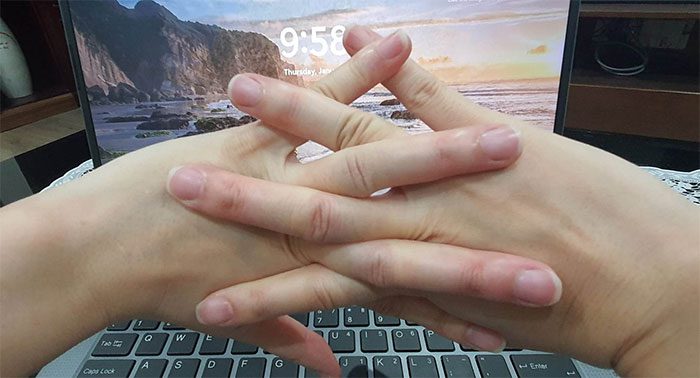Many people have a habit of cracking their knuckles, twisting their spine, or shaking their neck, even developing an “addiction” to the “crack” sound from these actions. Does this habit cause finger joints to swell or lead to early degeneration?
According to Dr. Bui Hai Binh from the Musculoskeletal Center at Bach Mai Hospital (Hanoi), there is a joint capsule between the joints, which contains synovial fluid that lubricates the joint ends, reducing friction during contact. Cracking the knuckles creates a change in pressure within the joint capsule, causing the synovial fluid to stretch and create space.
In the joint capsule, there is not only synovial fluid but also gas bubbles containing oxygen, CO2, and nitrogen – components found in blood. When the pressure changes, the gas bubbles in the joint capsule form or burst, causing the cracking sound.
In addition to larger joints with capsules such as finger joints and hip joints, twisting the spine also produces a “crack” sound due to the stretching of ligaments or the friction between surfaces and bones.
So, does the habit of cracking knuckles cause finger joints to swell, affect aesthetics, or harm health?
Dr. Binh references a study by Dr. Donald Unger (USA), who spent 60 years conducting research on knuckle cracking. Throughout those 60 years, Dr. Unger continuously cracked the knuckles of his left hand daily, while refraining from cracking his right hand for comparison. “This work received a ‘funny’ Nobel Prize,” Dr. Binh shared. After six decades of cracking his left hand, the American doctor found no difference between the two sides, and cracking did not cause inflammation or joint degeneration.
“A 2010 study involving 215 middle-aged individuals who cracked their knuckles showed similar results, indicating that there is no specific correlation between knuckle cracking and joint damage.“, Dr. Binh noted.
However, another study involving 300 people found that although cracking does not cause inflammation or degeneration, it does alter the soft tissue around the joint, leading to swelling and enlargement of the joint, and also reduces hand strength.
“This means that cracking knuckles can lead to enlarged finger joints and decreased hand strength,” Dr. Binh explained.
In reality, many people enjoy cracking their knuckles, twisting their backs, and shaking their necks, as it provides comfort, especially when sitting in one position for an extended time; many do this unconsciously.

Many people have a habit of cracking their knuckles. (Photo: TV)
Over the past 20 years, almost daily, patients have come to consult Dr. Binh about the popping and cracking sounds when they crack their knuckles, asking if it poses any issues or risks of degeneration. Although he himself has the habit of cracking his knuckles and has not noticed any changes, Dr. Binh believes that from a scientific perspective on the musculoskeletal system, this action is not advisable. Knuckle cracking creates impacts between the joint surfaces, which may lead to joint wear. In the long term, this could accelerate the degeneration process.
“If individuals do not have restricted joint movement, cracking does not cause pain, then it is not a problem. However, those with joint pain or deformities should refrain from cracking,” Dr. Binh advised. Furthermore, many people also have the habit of cracking their spines and shaking their necks, which is very dangerous.
“Many people are unaware of whether their spine has issues such as slippage, herniation, or osteoporosis. Cracking could lead to spinal fractures or disc herniation. Particularly for women, studies have shown that knuckle cracking may lead to enlarged hands, affecting aesthetics, hence it is advisable to limit this habit,” the doctor recommended.
When stressed or anxious, many people unconsciously crack their knuckles. The expert suggests that instead of cracking their knuckles, one could hold a pen, a coin, or a small ball to rotate, transforming the old habit into a new one. By focusing on establishing this new habit, one can eliminate the knuckle cracking habit while potentially increasing finger strength and flexibility.


















































